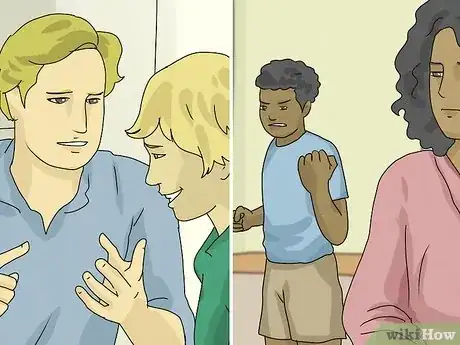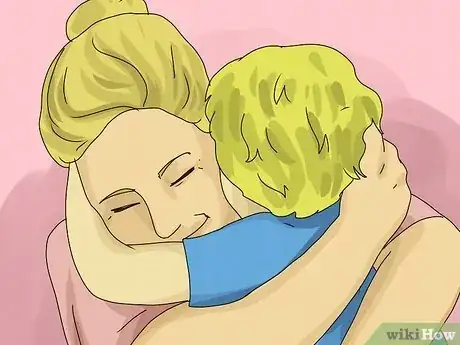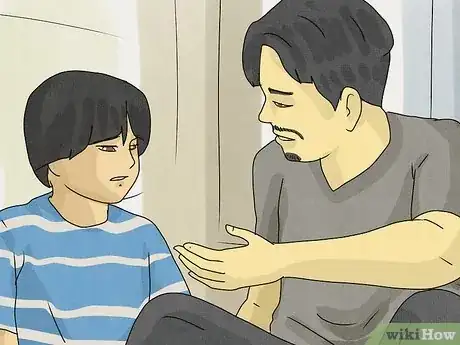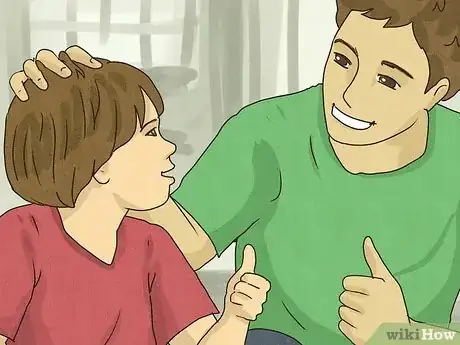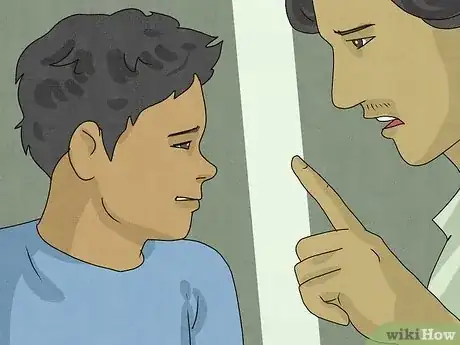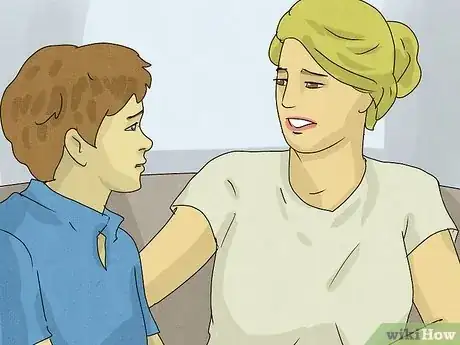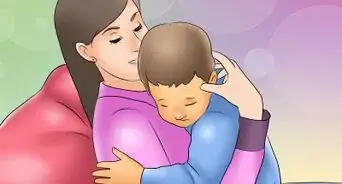This article was co-authored by Adam Dorsay, PsyD and by wikiHow staff writer, Danielle Blinka, MA, MPA. Dr. Adam Dorsay is a licensed psychologist in private practice in San Jose, CA, and the co-creator of Project Reciprocity, an international program at Facebook's Headquarters, and a consultant with Digital Ocean’s Safety Team. He specializes in assisting high-achieving adults with relationship issues, stress reduction, anxiety, and attaining more happiness in their lives. In 2016 he gave a well-watched TEDx talk about men and emotions. Dr. Dorsay has a M.A. in Counseling from Santa Clara University and received his doctorate in Clinical Psychology in 2008.
There are 12 references cited in this article, which can be found at the bottom of the page.
This article has been viewed 18,172 times.
A narcissistic child can be hard to handle, but you can learn how to defuse their behaviors. You may be worried that your child is a narcissist if they’re overly entitled or manipulative. We’re here to help you figure out if your child has Narcissistic Personality Disorder, whether they’re still young or have reached adulthood. Additionally, we’ll help you handle your child’s narcissistic behavior so you can improve your relationship.
Steps
Handling a Narcissistic Child
-
1Love your child unconditionally so they don't have to be the best. If your child believes your love has conditions, they’ll feel pressured to excel and always be the best. When you're frustrated, try to see things from your child’s perspective. Ask yourself how they might feel in a particular situation or why they might be reacting a certain way. Additionally, remind yourself that they didn’t choose to be a narcissist.[5]
- Consistently tell your child that you love them as they are. Say, “I’ll always love you, no matter what.”
- Praise their efforts, not their achievements. Say things like, “Hard work is what matters. Good job!” or “I’m so proud of you for sticking with it.”
-
2Model healthy relationships for your child. Your children learn from watching you, so be a great teacher. Be kind and respectful to others so your child knows that’s important. Additionally, be dependable for your friends and family so your child learns what it’s like to be loyal.[6]
- You might ask them what they notice about your relationships. You could say, “Did you see how I spoke kindly to my friend?” or “I just got invited to a party on the same day I offered to help Grandma. What do you think I should do?”
-
3Talk to your child about how their behavior affects others. Speak calmly to them so they don’t feel confronted. If you work together, you can understand where you’re both coming from and create some solutions. Narcissists are really focused on themselves, so use “we”-language to get your child on your side. You could say something like:
- “When we call people names, it really hurts their feelings. We speak kindly to others so they speak kindly to us.”
- “I understand why you want a new phone. At the same time, we have to wait for things that we want. It hurts my feelings when you demand items from me.”
- “I know you’re really busy with work, but I am, too. I’m really overwhelmed by the help you expect from me. We both need to do a better job of taking care of our own needs.”
-
4Speak calmly and firmly when addressing behavioral problems. Disciplining your child can feel very tricky since they can be like a ticking time-bomb. Narcissists are very sensitive to criticism and aggression, so they’ll blow up if they feel confronted.[7] Instead, sit down with them and tell them what they did wrong. Additionally, explain what they could do next time and any consequences they’ll face.
- If your child is very young, you might say, “We don’t throw toys at each other. Next time, tell me when you’re upset. We’re going to sit here for a few minutes while you calm down.”
- If your child is school-aged, you could say, “We don’t hit. It’s important that we keep our hands to ourselves. Next time, use your words. You’re going to spend the rest of the evening in your room so you have time to think about what you did.”
- For a teen, say something like: “We don’t lie in this family. I’m really hurt that you deceived me, and I’m worried you could put yourself in an unsafe situation. You’re grounded for the next two weeks.”
-
5Teach your child how to listen to others. Your child learns how to have conversations by practicing with you and by watching you converse with people. Start by taking turns talking and listening to each other. Then, create opportunities for your child to watch you speak with other adults. When your child is being a good listener, praise them for doing such a great job.[8]
- You could say, “I noticed that you did a great job listening to Grandma’s story today. I’m really proud of you,” or “Your teacher says you listened well in class today. Great job!”
-
6Praise them when they help someone. Encourage your child to act kindly to others. In time, this can help them overcome some of their narcissistic tendencies. You might compliment them for:[9]
- Helping you with a chore.
- Assisting a sibling.
- Volunteering.
- Showing affection.
- Saying “thank you.”
- Apologizing for a mistake.
-
7Set boundaries with your child. Your boundaries are what you’re willing to do for someone, as well as what you won’t do. When it comes to your child, you’d probably go to the ends of the earth for them. At the same time, they might make unreasonable requests sometimes, such as asking for a really expensive item. Establish boundaries with your child by setting some expectations. Say something like:
- “I’m not going to talk to you when you’re yelling. I’ll respond when you speak calmly.”
- “It’s not okay for you to call your sister names. If you do, I’m going to take away a privilege.”
- “I’m not going to buy you a toy while we’re grocery shopping.”
-
8Confront their sense of entitlement. A narcissistic child thinks they’re entitled to attention, accolades, and material items. They expect everyone to cater to their whims and will lash out if someone says, “no.”[10] Calmly tell your child that everyone is special in their own way, but no one gets everything that they want. Moving forward, tell them “no” when it’s appropriate.
- When you won’t buy them a toy, they might throw a tantrum. You could say, “I understand why you’re upset, but we’re not here for toys. Sometimes we can’t have what we want right away.”
- When they lose a sports game, they could react angrily. You could say, “Losing is frustrating, but it’s something we all experience. What’s important is having fun and doing your best. I’m proud of you for playing.”
- Expect your child to react angrily when you say “no,” at least at first. It’ll take them time to get used to it.
-
9Sandwich criticisms between compliments. Narcissists really struggle with criticism and typically get angry. To soften the blow, tell your child something they did well first. Additionally, say something nice afterwards. Your child may still get upset, but the compliments will make it easier for them to accept their faults.[11]
- “You did a great job cleaning your room today. On the other hand, I noticed you didn’t do your homework. You’re so smart, so I don’t want you to get a zero on the assignment.”
- “You played a great game today. However, it was rude to tease the other team. You really hurt their feelings. You’re so smart, I’m sure you could come up with something nice to say.”
-
10Take your child to therapy. A good therapist can help your child understand their behavior and make positive changes in their life. They’ll learn how to relate better to others, how to make friends, and how to develop a healthy self-esteem. Choose a child therapist with experience in treating Narcissistic Personality Disorder.[12] Additionally, make sure your child feels comfortable with them.
- You can find a therapist on Better Help.
- You might even go to family therapy so you all learn to understand the disorder and communicate better.[13]
-
11Practice self care to help you cope with your struggle. Parenting a narcissistic child can be very stressful, so make yourself a priority. To start, get proper sleep, eat well, and exercise. Additionally, do things that feel good to you, like playing with your pet or taking a bath.[14] You deserve to by happy.
- Set aside some time just for you. You may be able to relax at night after the kids go to bed. Alternatively, ask someone to babysit your child so you can have a few hours to treat yourself.
References
- ↑ https://www.mayoclinic.org/diseases-conditions/narcissistic-personality-disorder/symptoms-causes/syc-20366662
- ↑ https://www.ncbi.nlm.nih.gov/pmc/articles/PMC7216544/
- ↑ https://www.pnas.org/doi/10.1073/pnas.1420870112
- ↑ https://www.mayoclinic.org/diseases-conditions/narcissistic-personality-disorder/symptoms-causes/syc-20366662
- ↑ https://www.psychologytoday.com/us/blog/peaceful-parents-happy-kids/201403/5-secrets-love-your-child-unconditionally
- ↑ https://www.nm.org/healthbeat/healthy-tips/being-the-best-role-model
- ↑ https://www.helpguide.org/articles/mental-disorders/narcissistic-personality-disorder.htm
- ↑ https://raisingchildren.net.au/preschoolers/connecting-communicating/communicating/conversation-skills
- ↑ https://www.psychologytoday.com/us/blog/liking-the-child-you-love/202007/is-your-adult-child-narcissist
- ↑ https://www.helpguide.org/articles/mental-disorders/narcissistic-personality-disorder.htm
- ↑ https://psychcentral.com/blog/liberation/2018/01/11-mandatory-rules-for-dealing-with-a-narcissist#How-to-Deal-with-a-Narcissist
- ↑ https://www.mayoclinic.org/diseases-conditions/narcissistic-personality-disorder/diagnosis-treatment/drc-20366690
- ↑ https://my.clevelandclinic.org/health/diseases/9742-narcissistic-personality-disorder
- ↑ https://www.psychologytoday.com/us/blog/click-here-happiness/201812/self-care-12-ways-take-better-care-yourself
- ↑ https://www.helpguide.org/articles/mental-disorders/narcissistic-personality-disorder.htm

